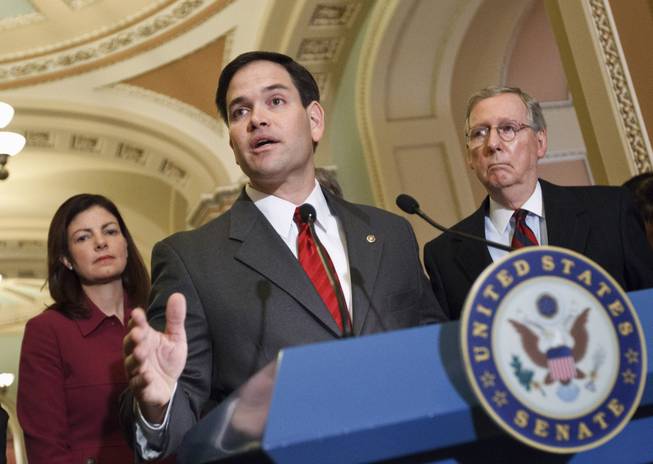
ASSOCIATED PRESS
Sen. Marco Rubio, R-Fla., center, accompanied by Senate Minority Leader Mitch McConnell of Kentucky, right, and Sen. Kelly Ayotte, R-N.H., gestures during a news conference on Capitol Hill in Washington on Feb. 8, 2012.
Tuesday, May 15, 2012 | 2 a.m.
Sun coverage
Sen. Marco Rubio of Florida has long been at the top of the list of Republican vice-presidential contenders for one key reason: The party thinks he can sway Latinos, who in 2008 proved to be the Democrats’ most critical swing vote.
So Rubio will have perhaps no more important audition to prove his worth to the party than when he unveils his alternate Dream Act, legislation that for the past decade has sought to put undocumented immigrants who were brought to the United States as children and are enrolled in college or the military on a pathway to citizenship. Under Rubio’s version, they would simply get residency without the citizenship option.
He’s expected to pull back the curtain on that bill any day now. But already, the Senate majority leader is hinting at a scathing review.
“There’s not been a single word put on paper, not a word. And remember, as with anything we do in life, the devil’s in the details,” Sen. Harry Reid said Sunday, appearing on Univision’s “Al Punto” with Jorge Ramos. “He says one thing to one group and another thing to another group. ... Marco, give us something in writing and I’d be happy to look at it.”
But Reid also added that he was “bound and determined” to pass a Dream Act that included a pathway to citizenship, declaring he would not consider anything short of that, even if the beneficiaries of such a bill are getting desperate enough to take Rubio’s reported deal.
In the absence of enough congressional support — including almost no Republican support — to tackle immigration reform, Reid has used the Dream Act as a means of reminding the Hispanic voting community about the difference between the parties and coalescing the voting bloc around Democrats.
Two years ago, it worked: Reid insisted on moving forward with the Dream Act, falling just five votes shy of what it needed to pass the Senate; Hispanic voters in Nevada turned out in greater-than-ever proportions to help re-elect him to the Senate (the turnout was far larger than his margin of victory).
Earlier this year, Reid strongly hinted to the Las Vegas Sun that he would be doing the same thing prior to the 2010 election.
Having a Rubio alternative could potentially complicate that by giving Republicans an alternative piece of legislation to which they could point and pledge their support.
But the test will be how much praise from Latinos Rubio gets when he puts out his bill.
Rubio, a Cuban-American, comes from an ethnic group that has tended to vote more Republican in presidential election cycles than have the Mexican and Salvadoran communities that dominate the Hispanic communities in Nevada. The illegal immigration debate plays differently in each of those communities.
Thus far, immigration advocates from Rubio’s home state of Florida have praised the concept of his proposal in the opinion pages of local newspapers. In a column in the Miami Herald last month, however, Reid said Rubio’s proposal would create “a permanent underclass ... (that) goes against the basic American value of equal opportunity.” But, he added, the Democrats’ “door remains open.”


Join the Discussion:
Check this out for a full explanation of our conversion to the LiveFyre commenting system and instructions on how to sign up for an account.
Full comments policy